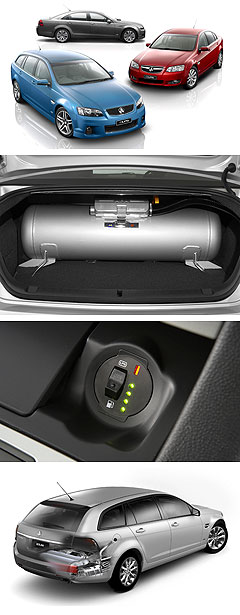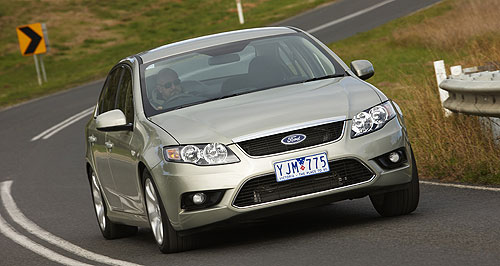Make / Model Search
News - General News - FuelsFord’s LPG system wins engineering gongRewarded: Ford’s EcoLPI dedicated LPG fuel delivery system won the praise of engineering peers. Holden pipped by crosstown rival Ford whose EcoLPI system goes gold5 Oct 2012 By IAN PORTER FORD has beaten rival Holden to Australia’s top automotive engineering prize in a face-off between their new LPG systems. The Society of Automotive Engineers Australasia’s gold award went to Ford Australia for its EcoLPi liquefied petroleum gas fuel system for the Falcon’s inline six engine, while Holden took solve for its development of an aluminium LPG fuel tank and associated fuelling system for the Commodore. The bronze went to Melbourne-based EV Engineering – a start-up company backed by a consortium of automotive industry suppliers – for its development of a Commodore powered only by electricity. The 16th annual engineering excellence awards were presented by the Society of Automotive Engineers – Australasia at the Melbourne Exhibition Centre this week. In awarding the gold prize to Ford, the judges recognised both the engineering achievement and also the national implications of a system that reduces the country’s dependence on imported fuel. Chief awards judge Shane Richardson said the switch from a gaseous LPG system to a liquid one brought several advantages.  Left: Holden's Commodore LPG range. Left: Holden's Commodore LPG range.“The reason for the winning of the gold is the demonstration of the advantage of encouraging the use of indigenous alternative fuels in a fully optimised design approach versus a conversion approach,” he said. “By the use of liquid fuel against gaseous injection, both a decrease in fuel consumption and emissions are achieved while the EcoLPi model actually has increased power, torque and performance feel over the traditional petrol-fuelled Falcon. “And the balance of trade implications, through the elimination of petrol imports, we thought that was a significant contribution towards the future sustainability of motoring in Australia.” In what turned out to be a battle of the LPG systems, the judges awarded the silver prize to Holden for its development of the aluminium LPG tank and associated fuel system. The use of aluminium for an LPG tank was a breakthrough because aluminium could be extruded, making complex shapes possible, minimising or eliminating the intrusion of the tank into the vehicle interior. “In this particular case, the team demonstrated an innovative use of aluminium and mass reducing design versus the traditional steel LPG tank,” said Mr Richardson. “(The design) included integrated features such as a lightweight shield, a bonded crash pad around the tank and a new fusible plug development. “We thought there was actually quite a lot of development that had gone into that tank, which has opened up a new direction for future LPG installations.” The bronze award went to EV Engineering, the small engineering shop started by several car parts and services companies to demonstrate the viability of electric vehicle manufacture in Australia. “The judges saw that this project established the viability of developing electric vehicles within the Australia automotive industry using existing manufacturing infrastructure and basic vehicle platforms versus a new and totally unique architecture,” Mr Richardson said. “We thought it was a very interesting development which gives some hope for the further expansion of electric vehicles without having to go to a totally new concept.” The GM Holden LPG system was recognised again when the young engineer award went to Chris Jones for the role he played in developing the system. He received his award from his department head, GM Holden engineering executive director Greg Tyus. The judges said Mr Jones contributed to the development and testing of the tar filter in the gaseous phase of the system, to the development of the aluminium fuel tank and also to the creation of a cold-start system that eliminated the expensive need for a parallel petrol supply. Mr Jones’s work was instrumental to the development of a new Australian standard in LPG engineering and also to a new standard that GM itself has adopted.  Read more |
Click to shareGeneral News articlesResearch General News Motor industry news |












Facebook Twitter Instagram